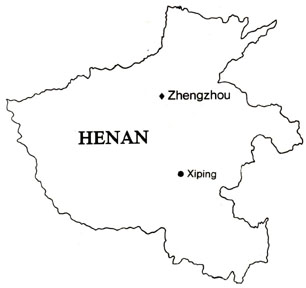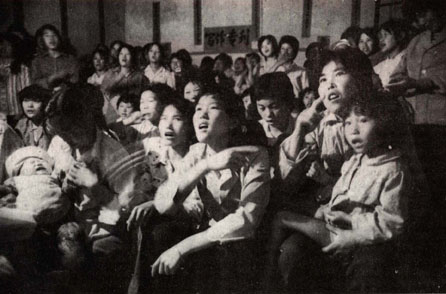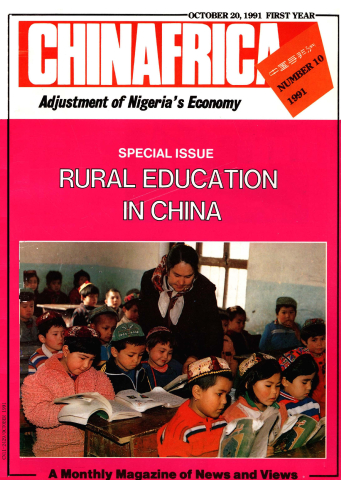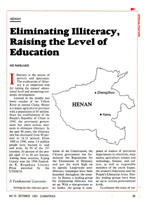Illiteracy is the source of poverty and ignorance. The eradication of illiteracy is an important step for raising the masses’ educational level and promoting economic development.
Located in the middle and lower reaches of the Yellow River in central China, Henan is a major agricultural province with a population of 85 million. Since the establishment of the People's Republic of China in 1949, the provincial government has taken serious measures to eliminate illiteracy. In the past 40 years, the illiteracy rate has decreased from 80 percent to 16.15 percent. From 1980 to 1990, some 3.5 million people have learned to read and write. In 85 of the 157 counties, 85 percent of the people aged 15 to 40 are literate. Among these counties, Xiping County won the 1990 Nadezhda K. Krupskaya Literacy Prize awarded by the UNESCO.
A Fundamental Guarantee
Acting on the relevant provisions of the Constitution, the Chinese government has formulated the Regulations for the Elimination of Illiteracy and put the work high on its agenda. Large-scale antiilliteracy campaigns have been launched throughout the country. In Henan, a leading group for eliminating illiteracy was set up. With a vice-governor as its leader, the group is composed of leaders of provincial departments in education, mass media, agriculture, science and technology, finance, and culture, as well as responsible members of the youth league, the women’s federation and the People’s Liberation Army. Similar leading groups have been set up at various governmental levels.
To enhance the sense of responsibility, Henan has instituted a contract system whereby chief administrators at all levels assumes full responsibility for spreading literacy and their performance in this work is closely monitored to evaluate their work competence. For the past three years, the province’s goal has been to teach 300,000 people how to read and write each year. To meet the quota, anti-illiteracy contracts have been signed between township authorities and villages, between villages and schools, and between schools and teachers.
To ensure success, governments at various levels have made a point to check on a regular basis the implementation of such measures as the signing of contracts, fund raising, allocation of personnel and construction of rural cultural and technological schools. Local governments are required to report the progress of the literacy campaign twice a year. In time for September 8, the annual International Literacy Day, the provincial government publishes the results of the campaign in various localities, and pace-setting groups and individuals are rewarded.
The Key Point
Getting illiterate people involved is only the first step towards literacy. The key to eliminating illiteracy is to raise the enthusiasm of teachers, so that they can do a good job and guarantee the teaching quality.
A large contingent of qualified teachers. According to statistics, there are 8,151 government functionaries in charge of the literacy campaign at the township level, an average of 3.8 per township; 15,504 village teachers and 37,553 part-time teachers, an average of 1.13 per village. Many primary and secondary school teachers have joined up. Village secondary and primary school students have also extended a helping hand in this massive war on illiteracy.
Training networks have been set up at the provincial, prefectural (city), county and township levels to raise the quality of teaching and administration. In December 1989, the provincial education commission co-operated with the UNESCO to hold a training programme for anti-illiteracy workers in the Henan Adult Education Training Centre, and specialists and experienced administrators were invited to give lectures. In 1990, the centre ran three more training sessions, with about 200 administrators attending. Educational administration bodies at all levels have also taken it upon themselves to train literacy administrators and teachers.
Dovetailing the teaching contents to rural economic growth. The contents of teaching should be changed and improved in light of local development. The farmers should be taught not only the basic skills of reading, writing and calculating but also some ABC of science and technology needed to improve their lot. Accordingly, the provincial education commission has compiled a series of textbooks such as Language and Technology, Applied Chinese, Applied Mathematics, Applied Science and Technology, and Language Textbook for Women. Local educational organizations have also compiled teaching material on family planning and sideline occupations. According to incomplete statistics, in the past ten years, over 100 varieties of antiilliteracy and post-literacy educational materials have been published in the province.
Flexible teaching approaches. In areas where the number of illiterate people is relatively large, the literacy programme is carried out in classes; in areas where the distribution of illiterate people is sparse, they are taught through group instruction or individual tutoring. Sometimes both approaches are adopted. Literacy classes are convenient for both teachers and students as well as for administrators. This approach always results in high teaching efficiency and quality. The individual approach is flexible, simple and convenient for the farmers’ way of life. For the past several years, many education bodies have strengthened their administrative and contract systems, whereby the tasks, schedules and exams are fixed and instruction, teaching methods and work assessment are standardized.
The economic reform and open policy instituted a decade ago have changed the farmers, mentality considerably. They need the practical knowledge that can help them prosper, and they want to learn it quickly. Bearing this situation in mind, the provincial education commission has been devising new approaches to adult education.
Preparing literates for the new social conditions. The Education Commission of Henan Province stipulates that those who have attended postliteracy classes must master some applied techniques. Those who have passed the examinations and achieved a certain level of education are given diplomas. In Xiping County, an international literacy prize winner (1990), the educational departments have supplemented higher literacy classes with cultural activities designed to consolidate literacy achievements. Follow-up surveys of those farmers who have learned how to read and write are made at three-year intervals.
Standards of Assessment
Subjecting individuals and units under the anti-illiteracy programme to state acceptance examinations is an important measure to consolidate the achievements and ensure the quality of the work to beat illiteracy. Through trial and error, the Henan authorities have formulated a series of ways and means in this regard.
The evaluation of each farmer's reading and writing competence is done at the township level by the local government. Those who have reached the literacy standards will get a certificate. Whether a work unit has eliminated illiteracy is judged by the higher-up authorities.
The provincial government supervises acceptance examinations at the county level. Specifically, a team composed of literacy administrators and supervisors selected from different parts of Henan is dispatched to each county, where team members report about the county’s anti-illiteracy work, check the literacy files, and verify the reports by interviewing the local people. Then, one-third of the villages of a township and one-third of the townships of the entire county are chosen at random for tests of the real results of the antiilliteracy work. These seemingly cumbersome procedures are designed to eliminate falsity and guarantee accuracy of the results of the acceptance examinations.


Women farmers respond actively to the anti-illiteracy campaign. XIN HUA


 Copy Reference
Copy Reference 